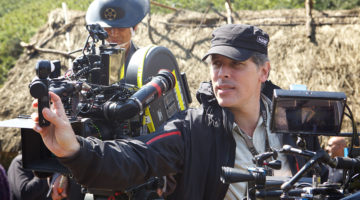Interview: Clea DuVall discusses The Intervention
We sat down with Clea DuVall, actor in such films as But I’m a Cheerleader, The Faculty, Argo, and Addicted to Fresno, in addition to multiple TV appearances. For the film The Intervention, DuVall not only acted in this fascinating film, but wrote and directed it as well. The multi-hyphenate, who is also very active on Twitter and promoting her beliefs, was very kind to donate her time and provided extremely in-depth enlightening answers about The Intervention.
Scene Creek: You’re a very strong advocate for social justice and change. What do you think is the importance now of having an intervention?
Clea DuVall: What’s happening here now, people are having necessary conversations and people are waking up and realizing that they need to be, myself included, having them all the time and not necessarily only once every four years, you know, because not having dialogues and not having conversations is what gets you into this place of thinking you know what is going to happen, and then you never really do. And with the movie, these characters are definitely opening up a dialogue that Melanie Lynskey’s character Annie certainly leads this charge, to a territory that she doesn’t belong in. It’s something that we all do, when we’re hurting or when we’re unhappy, it’s so much easier to focus on outside things. In that regard, I think it really does relate to where we are now, because I think that we…especially Americans are very good at having discussions about opinions about everything else, how everyone else is getting it wrong and now more than half the country (laughs) thinks that we didn’t get it right.
SC: You pulled together such a great cast though…
CD: Yes, I was very lucky to get such a strong cast in this little tiny movie, I felt very grateful that they all wanted to get in there with me, in the sweat and the heat in the summertime.
SC: Why did you choose to set your movie in Savannah?
CD: The thing that I love about Savannah is that on the surface it’s very beautiful, but underneath there’s so much going on and it’s so complicated and it’s so dark and I think that this really comes through. I wanted it to be somewhere that wasn’t L.A., that wasn’t New York, that wouldn’t be a place that everyone would be seeing, that wasn’t a place that everyone was going to be living. I wanted to take them out of their element and force them to be together, so it wasn’t an easy escape. As big as the house was, and as vast as the grounds were, you still felt very claustrophobic. I wanted it to feel like escape was not easy.
SC: And you were able to deal with your unexpected character, that being Cobie Smulders’ crutches?
CD: Oh yeah, (laughs), that was an interesting curveball to get, but I really thought it worked really well. It was like a physical embodiment of the problems she was having and I think it really worked.
SC: You had a seamless group of actors. How many were you newly working with versus who were friends?
CD: Yeah, Melanie (Lynskey), Natasha (Lyonne), Jason (Ritter), and Alia (Shawkat) are old friends of mine and Cobie (Smulders), Ben (Schwartz) and Vincent (Piazza) I met on the movie. It feels authentic to me, like all of our friendships. When you’re making a movie about lives, and everybody’s living together and everybody’s eating together and there are no trailers for everybody to go to (laughing), you really do develop a bond very quickly and I think that really shows through. Everyone who was in it really got it.
SC: What is next for you Clea?
CD: I’ve been writing. There are two scripts that I’ve been working on, developing a show, I really want to keep going in this direction. I really appreciate and respect and love storytelling, and I like having control over the stories I’I telling and the people with whom I’m working and I want to continue exploring that side of my creativity.
SC: You think that there are more stories to tell right now?
CD: Absolutely (laughing) I mean now more than ever. For example, having Natasha’s and my character being part of the group but not about being gay, it’s like normalizing something that is already normal. The more that it can debunk some the bizarre and untrue things that people think, the more that’s a step forward and I want to push the boundaries in terms of the types of stories I tell, and bring forth stories of the underrepresented.
SC: Agreed, it was surprising that it wasn’t a “gay film”.
CD: Yeah, I didn’t see it as a gay film, I never saw it as a gay film. I was making a film about people and relationships and there were gay characters in it and the movie wasn’t about that, and I think that so often there are gay-themed films which are very much about that and I’ve been a part of those movies and I think those movies are so important and it’s just as important to have stories in which people get to be people and sexual identity is not the headline. Like for a sixteen-year-old kid that feels scared and alone and ashamed, and they just can’t imagine just being able to live their life and not have that be such a big deal. Just being able to see people living and experience their life and having relationships and being happy and sad and have all of it be okay, it’s the aftermath of the It Gets Better, it’s gotten better and I think that’s a great thing to see.
The Intervention is now available on DVD from Paramount Home Entertainment.


